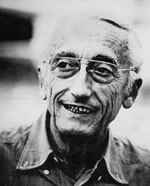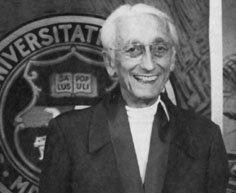 World-renowned environmentalist Jacques-Yves Cousteau received the World Ecology Award on March 17, 1992 from the International Center for Tropical Ecology at UM-St. Louis. For more than 50 years, Cousteau explored the earth's seas, observing marine life. Originally, his life's work was devoted to observing and recording the vitality of the living sea while commenting occasionally on our relationship to it. Over the years, however, he became increasingly aware of a deterioration in the ocean quality and a reduction in the abundance of marine life. Because of his knowledge of the immediate danger to mankind, Cousteau created The Cousteau Society in September 1973. The organization is dedicated to the protection and improvement of life. The non-profit, membership-supported organization with more than 150,000 members, principally in the United States.
World-renowned environmentalist Jacques-Yves Cousteau received the World Ecology Award on March 17, 1992 from the International Center for Tropical Ecology at UM-St. Louis. For more than 50 years, Cousteau explored the earth's seas, observing marine life. Originally, his life's work was devoted to observing and recording the vitality of the living sea while commenting occasionally on our relationship to it. Over the years, however, he became increasingly aware of a deterioration in the ocean quality and a reduction in the abundance of marine life. Because of his knowledge of the immediate danger to mankind, Cousteau created The Cousteau Society in September 1973. The organization is dedicated to the protection and improvement of life. The non-profit, membership-supported organization with more than 150,000 members, principally in the United States.
Jacques Cousteau was born in St. Andr de Cubzac (Gironde) in 1910, and entered the French Naval Academy in 1930. From 1933-1935, he was part of numerous campaigns in the Far East aboard the cruiser Primauguet. In 1936, he began experimenting with various prototypes of breathing apparatus, and in 1943, he and Emile Gagnan conceived and built the Aqua-Lung. After participating in the Resistance movement during World War 11, he created and organized, in conjunction with Commander Philippe Taillez, an Experimental Diving Unit in Toulon.
 In 1950, Captain Cousteau acquired Calypso, a minesweeper and transformed it into an oceanographic vessel. In 1957, he was elected Director of the Muse Ocanographique of Monaco and retired from the Navy with a rank of Captain. He resigned as Director of the Muse Ocanographique in 1988 after thirty-one years of service.
In 1950, Captain Cousteau acquired Calypso, a minesweeper and transformed it into an oceanographic vessel. In 1957, he was elected Director of the Muse Ocanographique of Monaco and retired from the Navy with a rank of Captain. He resigned as Director of the Muse Ocanographique in 1988 after thirty-one years of service.
In collaboration with ocean engineer Jean Mollard, he designed a diving saucer, a revolutionary round, highly maneuverable submarine, capable of diving to 350 meters with two passengers to observe and film the depths and even take samples. In 1980, with Professor Lucien Malavard and Bertrand Charrier, Cousteau studied new wind-propulsion systems for ships. Construction of the wind-propulsion cylinder, the Turbosail (TM) system, took place in 1982. Moulin Vent, an experimental ship equipped with the turbosail system, was launched in 1983. The system was refined during the next two years with construction, launching and ocean trial of a two-turbosail system on the experimental ship Alcyone, designed by a French naval architect Andr Mauric.
Since 1967, the Calypso team accomplished journeys, from the Red Sea to the Indian, Atlantic and Pacific Oceans; from the Antarctic to the Aegean. Calypso also explored many of the world's major river systems, including the Nile, St. Lawrence, Amazon and Mississippi. To increase environmental knowledge and awareness, Cousteau teams produced television films have been shown throughout the world. In 1985, teams aboard Calypso and Alcyone began a circumnavigation of the earth in a five-year Rediscovery of the World expedition to take a fresh look at the planet. Four hours of television programs were produced each year from "Rediscovery" voyages.
Jacques Cousteau produced over seventy films for television and won numerous Emmy and other awards. He also produced three full-length feature films: The Silent World (Oscar and Palme d'Or), World Without Sun (Oscar and Grand Prix du Cinema Franais pour la Jeunesse) and Voyage to the Edge of the World. Captain Cousteau wrote in collaboration with various co-authors, more than fifty books, published worldwide in more than a dozen languages. These include The Cousteau Almanac (1981) Jacques Cousteau's Calypso (1983), Jacques Cousteau's Amazon Journey (1984) and Jacques Cousteau Whales (1988).
After being awarded the Chevalier de la Lgion d'Honneur for service to the Resistance, Cousteau was promoted to Officer and Commander for scientific accomplishments. One of few foreign members of America's prestigious National Academy of Sciences, Captain Cousteau was the co-recipient in 1977 (with Sir Peter Scott) of the International Environmental Prize awarded by the United Nations for outstanding contributions in the field of the environment. He was awarded the U.S. Presidential Medal of Freedom in 1985. In 1987, Captain Cousteau was inducted into the Television Academy of Fame in California, and he received the Founders Award from the International Council of the National Academy of Television Arts and Sciences in New York.
In 1988, he was placed on the United Nations Environment Program's (UNEP) Global 500 Roll of Honor for Environmental Achievement and also received one of the National Geographic's Centennial Awards for special contributions to the National Geographic Society and to mankind. He was awarded honorary Doctor of Science degrees by the University of California at Berkeley, Brandeis University, Rensselaer Polytechnic Institute and Harvard University. In 1989, Captain Cousteau was inducted into the prestigious Acadmie Franaise, France's highest form of recognition for lifetime contribution to the nation's culture. In 1991, the Catalan Institute of Mediterranean Studies in Barcelona, Spain awarded Captain Cousteau its Third International Catalan Prize for his lifetime of work protecting and studying the world's oceans. On January 11, 1996 the Calypso sank in Singapore harbor. In his last years, Cousteau was involved in a legal battle with his son, Jean-Michael over the use of the Cousteau name. Jacques Cousteau died on June 25, 1997.